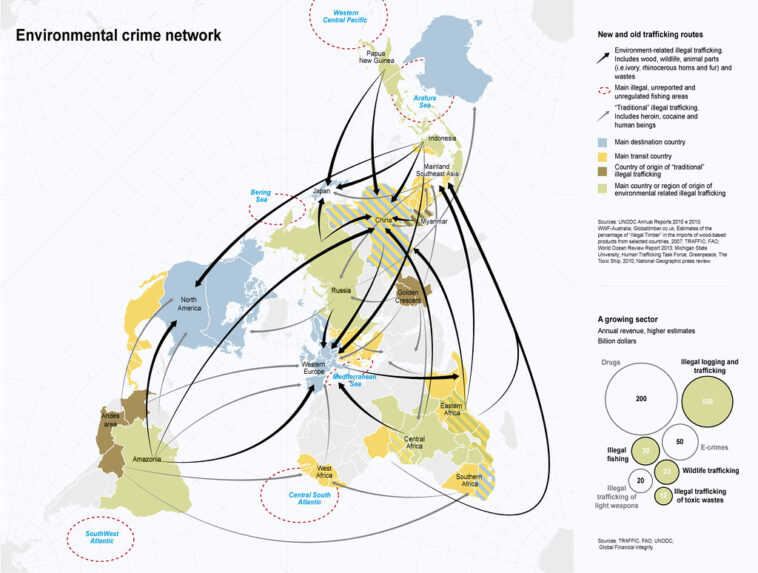
Environmental Crime – A Growing and Lucrative Menace
Introduction
Environmental crime is a severely damaging, rapidly growing, and lucrative criminal endeavor that affects countries indiscriminately, impacting biodiversity, national security, and socioeconomic development. This global issue requires a comprehensive understanding of its complex nature, causes, and large-scale impacts to develop effective strategies to combat it. However, due to its perception as a low priority by legal authorities, the issue has been largely neglected, leading to an ecosystem’s depletion, species extinction, and the endangerment of human health.
Environmental Crime Definition And Its Types
The definition of environmental crime encompasses a wide range of crimes illicitly and clandestinely operating, making it difficult to identify. According to the United Nations Environment Programme (UNEP) and INTERPOL, environmental crime is a collective term that describes illegal activities such as wildlife crimes, pollution crimes, prohibited chemicals trade, illegal fishing, illegal logging, and illegal mining that harm the environment and aim to benefit individuals, groups, or companies from the exploitation or damage of natural resources. These vicious act constitutes an annual growth rate of 5-7%, faster than the global economy, overtaking human trafficking as the third-largest criminal sector in the world after drug trafficking and counterfeiting. Furthermore, environmental crimes generate up to US$281 billion in illicit gains annually, making it one of the most profitable criminal enterprises in terms of profits.
Causes Of Environmental Crime
Environmental crime has a wide range of underlying causes, such as poor governance, widespread corruption, insufficient funding, and ineffective regulatory frameworks that permit low risks and high profits. These institutional causes highlight the structural deficiencies of national and international governance systems that enable and sustain environmental crimes. Additionally, poverty and demand act as drivers of environmental crime. The scarcity of products, such as wildlife, cheap illegal chemicals, gold, and minerals, increases their value attachment by buyers, incentivizing more offenders to commit these crimes.
Implications Of Environmental Crime
The various illegal activities constituting environmental crime affect resource depletion, ecosystem destruction, species extinction, human health, loss of revenues, and livelihoods, putting climate stability, food security, ecosystem resilience, and sustainable livelihood at risk. Furthermore, these crimes disrupt peace by benefiting armed groups and fueling armed conflicts, harm security by destabilizing countries, and hinder development by exacerbating poverty and inequality. The large and growing demand for wildlife products, exotic species and foods, timber, pulp, and essential natural resources provides a reliable source of income to these criminal organizations.
Efforts To Combat Environmental Crime
To combat environmental crime at the national level, countries like Brazil, China, and Nepal have demonstrated the effectiveness of comprehensive regulatory frameworks and prompt enforcement actions. Coordinated implementation has been accompanied by initiatives, such as the REDD mechanism, and programs that promote stakeholder engagement, indigenous peoples’ participation, and alternative livelihoods. Examples of international initiatives that have contributed to combating environmental crimes include the International Consortium on Combating Wildlife Crime, the Montreal Protocol, and the Fourteenth United Nations Crime Congress.
International Legal Framework Against Environmental Crime
At the international level, the United Nations Convention against Transnational Organized Crime (UNTOC) does not specifically address environmental crime, an issue that needs to be rectified urgently. According to the Fourteenth United Nations Crime Congress, combatting environmental crimes falls within the scope of the UNTOC. To strengthen enforcement of environmental criminal law, a fourth protocol has been proposed to introduce specific obligations for state parties regarding environmental crimes. Additionally, “ecocide” has been proposed as a fifth core crime in the Rome Statute to broaden the scope of international criminal law and allow the prosecution of environmental crimes at the international level.
The Way Forward
The international community must recognize and combat environmental crimes as a severe global threat affecting the environment, peace, security, and development. Combating environmental crime necessitates recognizing its time-sensitive nature and the need for immediate and sustainable global action. Rectifying the under-dimensioned resources allocated to combating environmental crimes is essential to combat the broad scope and profound impacts of the issue effectively. A comprehensive and coordinated global effort to address the driving factors and underlying causes of environmental crimes is at the heart of the strategy. Environmental crimes and their implications for development require a holistic approach that addresses poverty alleviation, complementary legislation, awareness-raising, and law enforcement.
Conclusion
Environmental crimes generate a ripple effect in the costs inflicted on communities and countries and hinder socioeconomic development. Recognizing the time-sensitive nature and the need for immediate and sustainable global action is crucial for combatting them. Taking proactive measures guarantees the sustainable use of natural resources, strengthens the rule of law, stabilizes countries, and alleviates poverty, effectively hampering the proliferation of environmental crimes. Combating environmental crimes requires a comprehensive strategy bringing together national governments and international agencies to tackle the issue’s broader threats effectively.
Originally Post From https://earth.org/explainer-what-is-environmental-crime/
Read more about this topic at
The rise of environmental crime: A growing threat to natural …
THE RISE OF ENVIRONMENTAL CRIME


